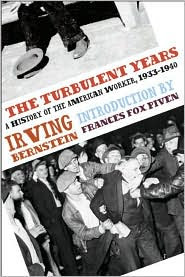 He recommended a few books on labor unions to Eve Gerber at FiveBooks, including:
He recommended a few books on labor unions to Eve Gerber at FiveBooks, including:The Turbulent Years: A History of the American Worker, 1933–1940Read about another book on Freeman's list.
Irving Bernstein
[Gerber:] Let’s go back in time for a minute. What can we learn by reading Irving Bernstein’s The Turbulent Years?
[Freeman:] The Turbulent Years covers the years of the Great Depression. What historians do, but economists do not do, is tell interesting stories about the labour events of that period. Bernstein had a talent for linking the stories of ordinary people to the historical phenomena of their times.
He writes about how workers fought to organise before the Wagner Act. The Wagner Act, otherwise known as the National Labor Relations Act of 1935, prohibited large firms from interfering with the right to organise and discriminating against employees who did. The Wagner Act represented an effort to give us an electoral way for workers to choose whether they wanted to be represented by a union or not.
The Depression experience in Bernstein’s book shows that you can only push people so far before they snap back. These were years when people had lost faith in how the business community was running the country. They had lost faith in how President Hoover had been running the country. Even though there was 20-25 percent unemployment, people were willing to risk their jobs to fight – not just for better wages and labour conditions, but for a better American labour system.
Are there any lessons that today’s labour leaders can draw from the difficulties labour had in organising and maintaining unions throughout the Great Depression?
I think one of the problems in the United States right now is that our labour leaders have not shown the same fight and creativity that the people did in those days. U.S. unions and labour leaders have been hunkered down and on the defence for twenty years. The guys in the Great Depression did not hunker down. They took chances, they tried new institutional forms and strategies, and they helped workers create a new labour movement.
--Marshal Zeringue





